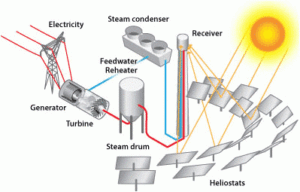Concentrated Solar Power (CSP)
 CSP technologies enable the conversion of solar energy as heat into electrical energy. This is accomplished through the use of mirrors to reflect and concentrate sunlight onto receivers, where the light is converted to heat. The thermal energy can be directly used to drive a heat engine/turbine to produce electricity or stored and utilized at a later time. At the Rao Lab, we are working to develop novel technologies that can reduce the cost of solar energy by pursuing cutting-edge research directions that enable higher receiver efficiencies, compact and more efficient high-temperature heat exchangers for supercritical fluids, and high-temperature thermal energy storage technologies.
CSP technologies enable the conversion of solar energy as heat into electrical energy. This is accomplished through the use of mirrors to reflect and concentrate sunlight onto receivers, where the light is converted to heat. The thermal energy can be directly used to drive a heat engine/turbine to produce electricity or stored and utilized at a later time. At the Rao Lab, we are working to develop novel technologies that can reduce the cost of solar energy by pursuing cutting-edge research directions that enable higher receiver efficiencies, compact and more efficient high-temperature heat exchangers for supercritical fluids, and high-temperature thermal energy storage technologies.
Sorption Phenomena
The last decade has seen tremendous progress in the development of novel nano-/microstructured sorbents (e.g., metal organic frameworks or MOFs) for a variety of applications including energy storage/transformation and catalysis due to the remarkable control of their structural and chemical interactions. At the Rao Lab, our goal is to understand the transport and interactions in these novel materials with innovative measurement techniques and to develop insights that unlock the potential of these materials to address challenges associated with waste-heat utilization (~66 Quadrillion BTU), solar-thermal storage, and freshwater scarcity.
Volumetrically Absorbing Thermally Insulating (VATI) Receivers
In this project we are developing a cost-effective approach to reduce optical and thermal losses from CSP receivers at high temperatures (750°C). Utilizing high temperature stable SiC porous structures as a volumetrically absorbing and thermally insulating (VATI) layer the optical and thermal losses from the receiver can be dramatically reduced. This project will engineer the optical and thermal properties of porous SiC based on high-fidelity models of energy transport and validate component level performance experimentally at 1000x solar concentration and operational temperature of 750°C. Collaborators: Prof. Francoeur and Prof. Park (UoU, MechE).
